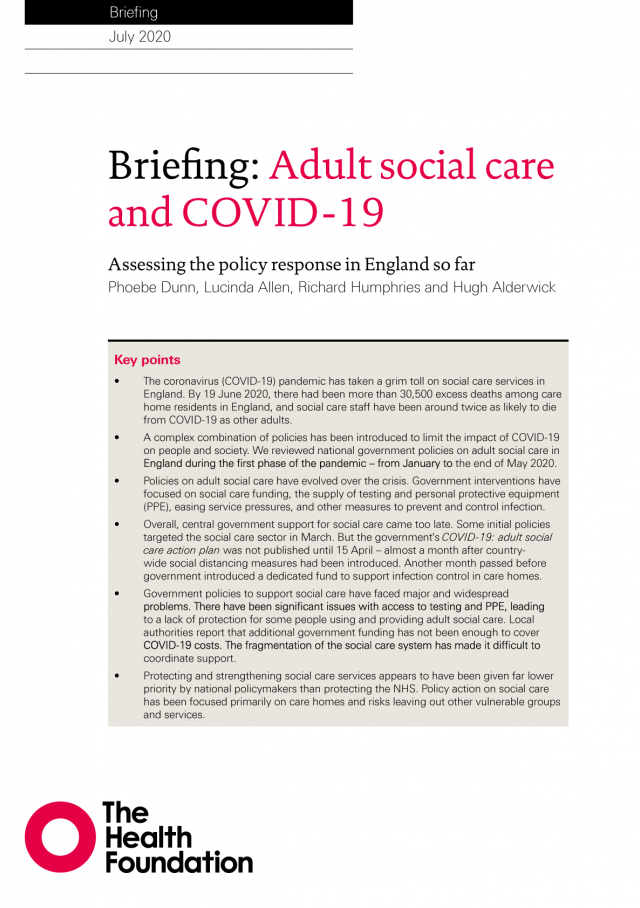Adult social care and COVID-19: Assessing the policy response in England so far Our analysis of the national government policy response during the first phase of the pandemic
July 2020

Key points
- The coronavirus (COVID-19) pandemic has taken a grim toll on social care services in England. By 19 June 2020, there had been more than 30,500 excess deaths among care home residents in England, and social care staff have been around twice as likely to die from COVID-19 as other adults.
- A complex combination of policies has been introduced to limit the impact of COVID-19 on people and society. We reviewed national government policies on adult social care in England during the first phase of the pandemic – from January to the end of May 2020.
- Overall, central government support for social care came too late. Some initial policies targeted the social care sector in March. But the government's COVID-19: adult social care action plan was not published until 15 April – almost a month after countrywide social distancing measures had been introduced. Another month passed before government introduced a dedicated fund to support infection control in care homes.
- Government policies to support social care have faced major and widespread problems. There have been significant issues with access to testing and PPE, leading to a lack of protection for some people using and providing adult social care. Local authorities report that additional government funding has not been enough to cover COVID-19 costs. The fragmentation of the social care system has made it difficult to coordinate support
- Protecting and strengthening social care services appears to have been given far lower priority by national policymakers than protecting the NHS. Policy action on social care has been focused primarily on care homes and risks leaving out other vulnerable groups and services.
- The social care system that entered the pandemic was underfunded, understaffed, undervalued and at risk of collapse. Any response to COVID-19 – however fast or comprehensive – would have needed to contend with this legacy of political neglect.
- Government must learn from the first phase of the COVID-19 response to prepare for potential future waves of the virus. Short-term actions should include greater involvement of social care in planning and decision making, improved access to regular testing and PPE, and a commitment to cover the costs of local government’s COVID-19 response.
- More fundamental reform of the social care system is needed to address the longstanding policy failures exacerbated by COVID-19.
Adult social care and COVID-19. Assessing the policy response in England so far reviews national government policies on adult social care in England during the first phase of the COVID-19 pandemic – from January to the end of May 2020.
In this briefing, we provide a detailed description and timeline of the government’s social care response. We consider the role that social care has played in the overall policy narrative. We also identify the underlying factors within the social care system, such as its structure and funding, that have shaped its ability to respond. We argue that central government support for social care came too late and that policy action on social care has been focused primarily on care homes and risks leaving out other vulnerable groups and services. Longstanding issues within the system – including underfunding, workforce shortages, system fragmentation, and lack of quality data – have shaped the ability of the sector to respond.
We identify several priorities to help prepare for potential future waves of the virus. Short-term actions should include greater involvement of social care in planning and decision making, improved access to regular testing and PPE, and a commitment to cover the costs of local government’s COVID-19 response. More fundamental reform of social care is needed to address the longstanding policy failures exacerbated by COVID-19. This reform must be comprehensive, including action to improve pay and conditions for staff, stabilise the care provider market, increase access to publicly funded services, and provide greater protection for people against social care costs.
Cite this publication
Further reading
Work with us
We look for talented and passionate individuals as everyone at the Health Foundation has an important role to play.
View current vacanciesThe Q community
Q is an initiative connecting people with improvement expertise across the UK.
Find out more


